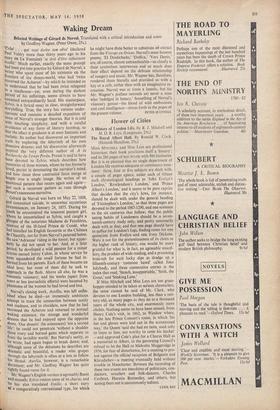Flower of Cities
A History of London Life. By R. J. Mitchell and M. D. R. Leys. (Longmans, 25s.)
The Royal Albert Hall. By Ronald W. Clark. (Hamish Hamilton, 25s.) MISS MITCHELL and Miss Leys are professional historians; their book proclaims itself a 'history': and its 286 pages of text bristle with 886 footnotes. But it is so planned that no single department of London life receives adequate or continuous treat- ment : three, four or five subjects are dealt with, a- couple of pages apiece, under each of fifteen such chronological headings as 'John Evelyn's London,' Rowlandson's London,' and 'Prince Albert's London,' and it seems to be pure caprice that decides that the city's Jews, for instance, should be dealt with under the general heading of Titzstephen's London,' so that three pages are devoted to the period 1087-1290, and one sentence to the six centuries that follow; that the public eating habits of Londoners should be a seven- teenth-century study only, and pretty summarily dealt with at that; and that one page should have to suffice for London's fogs, finding room for one quotation from Evelyn and one from Dickens. Were it not for the pretentiousness of its claim to the higher rank of history, one would be more grateful for what is, in fact, an agreeable miscel- lany, the product of wide reading, and a promising bran-tub for such lucky dips as dredge up a fifteenth-century 'common bawd' called Joan Jolybody, and three consecutive entries in the index that read, 'Stench, insupportable,"Stink, the Great,' and 'Stinking Lane.'
If Miss Mitchell and Miss Leys are too grass- hopper-minded to be taken as serious chroniclers, the same cannot be said of Mr. Clark, who devotes to one London building, less than a cen- tury old, as many pages as they do to a thousand years of the whole city, and enormously more clichés. Nothing seems to have been missed, from Henry Cole's visit, in 1862, to Windsor where, in the late Prince Consort's room, in which 'his hat and gloves were laid out in the accustomed way,' the Queen 'said she had no taste, used only to listen to him, not worthy to untie his latchet' —and approved Cole's plan for a Chorus Hall as a memorial to Albert, to the governing Council's refusal to let the Hall to Malcolm Muggeridge in 1956, for fear of disturbance, for a meeting to pro- test against the official reception of Bulganin and Khrushchev—a meeting eventually held without trouble in Manchester. Between the recording of these two events are anecdotes of politicians, con- ductors, wrestlers and folk-dancers, Charles Cochran, Horatio Bottomley, and others, but nosing them out is uncommonly tedious.
CYRIL RAY


































 Previous page
Previous page